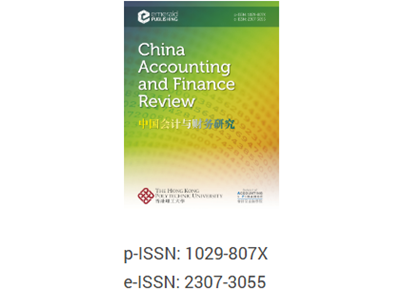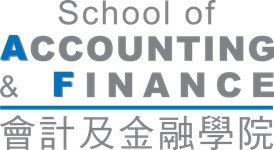
China Accounting and Finance Review (CAFR)
China Accounting and Finance Review (CAFR) is a leading double-blind peer-reviewed academic journal established in 1999 by The Hong Kong Polytechnic University (PolyU) in collaboration with Tsinghua University.
Published five times a year (in March, May, July, September and December), CAFR has been rated “A” in the Australian Business Deans Council (ABDC) Journal Quality List and indexed in the Directory of Open Access Journals (DOAJ), the Australian Research Council (ARC) and the American Economic Association’s EconLit. It is also a “Partners in Publishing Journal” featured in the Accounting Research Network on SSRN.
Contact Information:
China Accounting and Finance Review (CAFR) Editorial Office,
The Hong Kong Polytechnic University
The China Accounting and Finance Review (CAFR) is dedicated to promoting empirical and theoretical research and studies on significant accounting and finance issues, and serving as a platform for financial economists from China and around the world to share their views and investigations on a wide range of contemporary and cutting-edge issues relating to both the Chinese and international financial markets.
While initially published articles written in both Chinese and English which mainly focused on China-specific issues, since 2022 CAFR has become a purely English journal. Besides, it has also expanded its scope to welcome submissions of original and high-quality research papers and literature reviews that address any topics relating to accounting and finance globally.
Additionally, CAFR also strongly encourages cross-disciplinary and interdisciplinary research that bridges accounting and finance with other related fields. It aims to contribute to a more comprehensive understanding of the evolving landscape of accounting and finance in both Chinese and international contexts. Recognizing the increasing interconnectedness of financial markets, technological advancements and global challenges, the Journal also promotes a holistic approach to research. As such, it welcomes submissions that:
- Integrate accounting and finance principles with other disciplines such as economics, management, information technology, data science, environmental studies and social sciences;
- Explore the intersections between traditional financial topics and emerging areas such as artificial intelligence, blockchain technology and big data analytics;
- Investigate the financial implications of global issues, such as climate change, sustainable development and social responsibility;
- Examine the impact of policy changes, regulatory frameworks and cultural factors on accounting and finance practices across regions and economies; and
- Apply innovative methodologies and cross-disciplinary approaches to address complex financial and accounting challenges.
Editor-in-Chief
Prof. Qiang Wu
The Hong Kong Polytechnic University
Consulting Editors
Prof. C. S. Agnes Cheng
University of Oklahoma
Prof. Iftekhar Hasan
Fordham University
Prof. Xuan Tian
Tsinghua University
Prof. Laurence Van Lent
Frankfurt School of Finance & Management
Editors
Prof. Mark Anderson
University of Calgary
Prof. Kee-Hong Bae
York University
Prof. Jie (Jay) Cao
The Hong Kong Polytechnic University
Prof. Xiaofang Chen
Wuhan University of Technology
Prof. Junxiong Fang
Zhejiang University of Finance and Economics
Prof. Bill Francis
Rensselaer Polytechnic Institute
Prof. Guojin Gong
University of Connecticut
Prof. Thomas Hansen
Virginia Commonwealth University
Prof. Shawn Huang
Arizona State University
Prof. Sterling Huang
New York University Shanghai
Prof. Bin Ke
National University of Singapore
Prof. Yongtae Kim
Santa Clara University
Prof. Wenjing Li
Jinan University
Prof. Yupeng Lin
National University of Singapore
Prof. Frank Hong Liu
Loughborough University
Prof. Connie X. Mao
Temple University
Prof. Mujtaba Mian
Prince Mohammed Bin Salman College
Prof. Linda Myers
The University of Tennessee
Prof. Rachna Prakash
University of Mississippi
Prof. Meijun Qian
Zhejiang University International Business School
Prof. Srinivasan Rangan
Indian Institute of Management Bangalore
Prof. Walid Saffar
The Hong Kong Polytechnic University
Prof. Katherine Schipper
Duke University
Prof. Wei-Ling Song
Louisiana State University
Prof. Nancy Su
The Hong Kong Polytechnic University
Prof. Avanidhar (Subra) Subrahmanyam
The University of California, Los Angeles
Prof. Kun Wang
Tsinghua University
Prof. M.H. Franco Wong
University of Toronto
Prof. Chaopeng Wu
Xiamen University
Prof. Eliza Wu
University of Sydney
Prof. Xing Xiao
Tsinghua University
Prof. Nianhang Xu
Renmin University of China
Prof. Xinpeng Xu
The Hong Kong Polytechnic University
Prof. George Yang
The Chinese University of Hong Kong
Prof. Tong Yao
University of Iowa
Prof. Kangtao Ye
Renmin University of China
Prof. Aaron Yoon
Northwestern University
Prof. Xintong Zhan
Fudan University
Prof. Hao Zhang
Rochester Institute of Technology
Prof. Tianyu Zhang
The Chinese University of Hong Kong, Shenzhen
Prof. Yijiang Zhao
American University
Prof. Nan Zhou
University of Cincinnati
Prof. Luo Zuo
National University of Singapore
Editorial Office
Editorial Office
The Hong Kong Polytechnic University
af.cafr@polyu.edu.hk
Submission Guidelines
CAFR welcomes submissions that abide by the editorial policy via ScholarOne. All submitted manuscripts must be written in English. Please read the Author Guidelines before making a submission.
Peer Review Policy
CAFR adopts a rigorous peer-review process. All submitted manuscripts will initially be checked and then send to the Editor if they comply with the Journal’s author guidelines. After that, they will be evaluated by the Editor who is an expert on accounting and finance. If deemed suitable for further consideration, the manuscripts will then be subjected to peer-review by independent and anonymous experts. Based on their expertise, the reviewers will assess both the quality and originality of the manuscripts, as well as the manuscripts’ contribution to the knowledge of accounting and finance, and provide detailed and constructive comments to the authors for improving and enhancing the quality of the manuscripts.To ensure the impartiality of the review process, a double-blinded approach will be adopted in the reviewing process to ensure that the authors will not know the identities of the reviewers of their submissions, and the reviewers also will not know the identities of the authors of the manuscripts they review.
While the time for reviewing may vary for different manuscripts, CAFR’s goal is to inform the authors of the decision on their submissions within 60 days.
For inquiry, please contact the CAFR Editorial Office via email at af.cafr@polyu.edu.hk.
CAFR is an open access journal, and all published articles are available online for free and permanent access immediately after publication, with no subscription charge or registration requirements.
Latest Articles and Current Issue
All volumes and Issues since 1999
November 29, 2025
CAFR Special Issue Conference 2025 (Theme: Frontier research in accounting and finance)
Yunnan University of Finance and Economics, Kunming, China
November 30, 2024
CAFR Special Issue Conference 2024 (Theme: Contemporary issues in accounting and finance)
Chongqing University, Chongqing, China
December 2, 2023
CAFR Special Issue Conference 2023 (Theme: The role of accounting and finance in digital economy)
Jinan University, Guangzhou, China
September 17-18, 2021
CAFR 2021 Virtual Annual Conference (Theme: ESG)
Online
November 28 and December 1, 2020
CAFR Fundamental Analysis Symposium
Online
September 26-27, 2020
CAFR 2020 Virtual Annual Conference (Theme: Taxation)
Online
January 2, 2020
CAFR Research Workshop (Theme: Global Development in Fintech and Its Implications to Accounting, Finance, and Law Research)
San Diego, U.S.A.
September 20-21, 2019
CAFR Knowledge Transfer Forum
Dongguan & Hong Kong, China
July 3-5, 2019
2019 Summer Research Boot Camp on Financial Intermediation and Markets
Tsinghua University, Beijing, China
November 30, 2016
China Accounting and Finance Review (CAFR) 2016 Conference
May 15, 2015
The Joint China Accounting and Finance Review (CAFR) and Journal of Accounting, Auditing and Finance (JAAF) Conference




